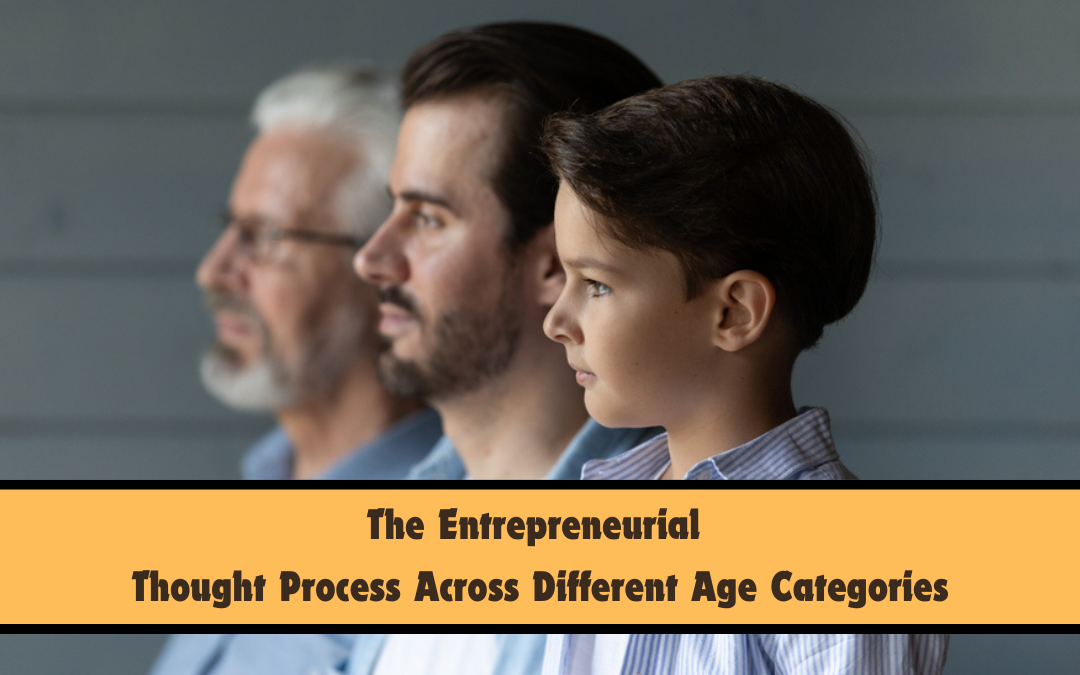Entrepreneurial spans across all age groups, with distinct thought processes influenced by factors like experience, risk tolerance, and personal values. While younger entrepreneurs often chase innovation and rapid growth, older entrepreneurs focus on sustainability, legacy, and purpose. Let’s dive deeper into the thought processes across different age groups and support these insights with data.
1. Young Entrepreneurs (18–30 years)
Characteristics:
- Driven by Innovation and Trends
Young entrepreneurs are often at the forefront of innovation, quickly adopting new technologies and spotting emerging trends. This group is especially adept at identifying and capitalizing on opportunities in digital spaces, such as e-commerce, apps, and social media-based businesses. - Risk Takers and Visionaries
According to a 2021 report by Guidant Financial, 27% of millennial Entrepreneurial are (aged 26–41) are drawn to entrepreneurship for the desire to pursue their passion, with 17% motivated by the desire to disrupt existing markets. Their risk tolerance is higher, given fewer financial obligations and personal responsibilities. Their thought process often revolves around “big ideas,” with a high tolerance for uncertainty. - Focus on Growth and Scalability
Growth and scalability are key motivators. Young entrepreneurs often prioritize rapid growth and are eager to attract investors or venture capital to expand quickly. They are highly focused on building scalable products that can disrupt industries or create new markets. Young entrepreneurs tend to prioritize scaling their businesses quickly. Harvard Business Review highlights that many startups led by entrepreneurs in their 20s and early 30s focus heavily on venture capital funding, with the goal of rapid growth and market expansion. - Collaborative and Learning-Oriented
This group often seeks out mentors, networking opportunities, and learning experiences to gain practical insights. Their thought process revolves around experimentation, iteration, and learning from failures without the fear of long-term consequences.
Statistics:
- Global Entrepreneurship Monitor (GEM) found that 19% of adults aged 18–24 actively engage in entrepreneurial activities globally.
- The Kauffman Foundation reports that 28.5% of startups in the US are led by entrepreneurs between the ages of 20 and 34.
Examples:
- Entrepreneurs like Mark Zuckerberg, who started Facebook in his early 20s, exemplify the drive for innovation and rapid growth at a young age.
2. Mid-career entrepreneurs (30–45 years)
Characteristics:
- Strategic and Experience-Driven
Entrepreneurs in their 30s and 40s are typically more experienced, having spent a significant amount of time in the workforce or other entrepreneurial ventures. Their thought process is more calculated, often focusing on identifying market gaps and using industry experience to solve real-world problems. - Balancing Risk and Stability
At this stage, entrepreneurs often have more responsibilities—families, mortgages, and established careers—so they may balance risk-taking with the need for financial stability. They are more strategic in their decisions, with a focus on building sustainable business models that generate consistent cash flow. - Work-Life Balance
Many entrepreneurs in this age group place greater emphasis on creating businesses that offer work-life balance. This leads to a focus on flexible business models that allow them to fulfill personal and family commitments while still growing their business. Many mid-career entrepreneurs design their businesses with flexibility in mind. Data from Gallup shows that 67% of entrepreneurs aged 30–45 are motivated by the need to create a balanced lifestyle, compared to only 52% of entrepreneurs in their 20s. - Networking and Resource Utilization
Entrepreneurial in this category rely heavily on professional networks they’ve built over the years, using connections to gain resources, advice, or partnerships. Their thought process includes leveraging these networks for scaling and expanding the business effectively.
Statistics:
- The Kauffman Foundation found that the average age of a first-time entrepreneur in the US is 42 years old, showing that mid-career individuals dominate new business creation.
- According to MIT Sloan School of Management, entrepreneurs in their early 40s are 2.1 times more likely to build a high-growth startup than younger founders.
Examples:
- Entrepreneurs like Elon Musk and Sara Blakely (founder of Spanx), who both built highly successful businesses in their 30s and 40s, demonstrate a balance between innovation, risk, and sustainability.
3. Late-career entrepreneurs (45–60 years)
Characteristics:
- Purpose-Driven and Legacy-Oriented
As entrepreneurs approach their 50s and beyond, their motivations often shift towards purpose-driven ventures. Their thought process revolves around building something meaningful—whether that’s creating a legacy, giving back to the community, or addressing societal challenges. - Cautious and Calculated Risk-Takers
This age group tends to be more risk-averse due to financial obligations, such as retirement savings or educational costs for children. They approach entrepreneurship with more caution, conducting thorough market research, financial planning, and risk assessments before launching or expanding their business. Data from SCORE shows that 69% of entrepreneurs aged 45–60 report being more cautious with their investments, focusing on long-term sustainability over rapid expansion. - Focus on Mentorship and Team Development
Entrepreneurs in this age group frequently prioritize mentorship, both as mentors and mentees. Their thought process includes building strong teams, investing in talent development, and creating an environment of growth for others. Many also seek to pass on their knowledge to the next generation of entrepreneurial. - Long-Term Sustainability Over Rapid Growth
Instead of chasing rapid growth, late-career entrepreneurs often focus on long-term sustainability. They prefer steady, consistent growth over volatile, high-risk expansion strategies. The thought process here revolves around minimizing risks and ensuring that the business can survive market fluctuations.
Statistics:
- Kauffman Foundation research reveals that entrepreneurs aged 45 and above represent 40% of all business owners in the US.
- A study by the US Census Bureau found that the highest success rate for new businesses occurs in the 45–54 age group, with 42.6% still operating after four years, compared to younger founders.
Examples:
- Entrepreneurs like Howard Schultz (former CEO of Starbucks) and Arianna Huffington, who founded HuffPost and Thrive Global in their later careers, are great examples of those who built businesses with a strong sense of purpose and long-term sustainability in mind.
4. Agewise Entrepreneurs (60+ years)
Characteristics:
- Legacy and Impact
Entrepreneurs in their 60s and beyond are often motivated by a desire to leave a lasting legacy. Their ventures may focus on philanthropy, social impact, or using their expertise to improve industries they care about. Their thought process is deeply aligned with creating a positive and enduring impact. - Risk Aversion and Financial Security
With retirement and financial security in sight, agewise entrepreneurs tend to be the most risk-averse. They are focused on maintaining or enhancing financial stability rather than chasing high-risk, high-reward opportunities. Their ventures are usually well-thought-out and grounded in realism, using decades of experience to guide decision-making. A 2022 AARP report highlights that 53% of entrepreneurs aged 60+ are driven by the desire to remain active, financially secure, and engaged in meaningful work post-retirement. - Focus on Mentorship and Knowledge Transfer
At this stage, many entrepreneurs seek to mentor younger generations. Their thought process emphasizes the importance of passing down knowledge and ensuring that the next wave of business leaders is equipped to succeed. They often use their ventures as platforms for mentorship and collaboration. - Simplicity and Work-Life Integration
Agewise entrepreneurs often value simplicity, designing businesses that integrate seamlessly with their desired lifestyle. They tend to focus on businesses that allow them to pursue personal interests, maintain flexible schedules, and avoid the burnout that often comes with high-stress entrepreneurial.
Statistics:
- According to Kauffman Foundation, entrepreneurs aged 55–64 accounted for 23.4% of all new entrepreneurs in 2021.
- A study from Cleveland State University shows that 70% of older entrepreneurs build businesses that prioritize social impact and legacy over financial returns.
Examples:
- Entrepreneurs like Ray Kroc, who expanded McDonald’s into a global franchise at age 52, and Colonel Harland Sanders, who started Kentucky Fried Chicken (KFC) in his 60s, exemplify agewise entrepreneurs who created iconic businesses late in life, emphasizing legacy, impact, and financial prudence.
Conclusion
The entrepreneurial thought process varies significantly across different age categories, influenced by life experience, responsibilities, and personal values. Younger entrepreneurs often prioritize innovation and growth, while mid-career entrepreneurs focus on balancing risk and stability. Late-career and agewise entrepreneurs bring experience, legacy-building, and a strong sense of purpose into their ventures. Despite these differences, entrepreneurs at every stage of life share a common drive to solve problems, innovate, and make a lasting impact on their industries.












